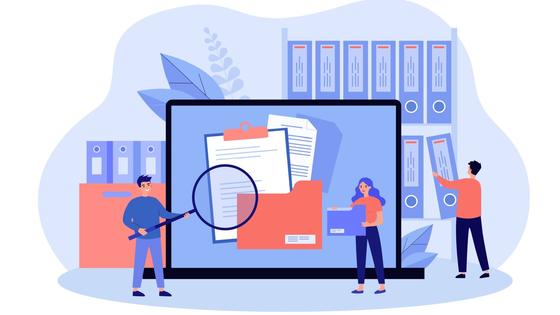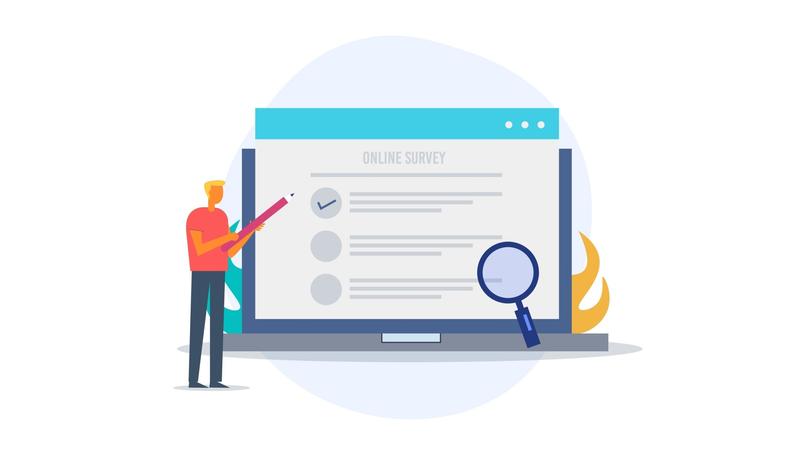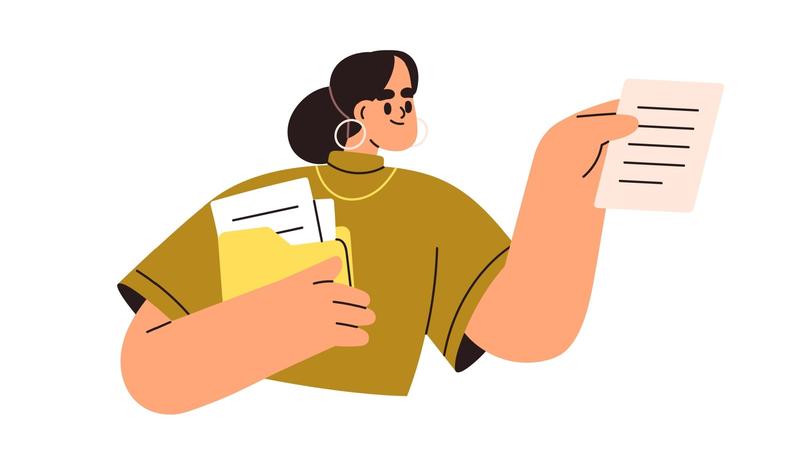Afloat: A Guide for Those Drowning in a Sea of Information and Don’t Know Where to Look
Sometimes, looking back, I am amazed at how simple and limited the world was just twenty years ago, and how diverse, complex, and confusing it is now.

Of course, this has undeniable advantages, for example, the ability to study anything anywhere with the help of the same online courses that Lectera offers, or ordinary articles on Wikipedia. Just think: access to all the information in our world is literally in the palm of your hand! But for most people, for some reason, this causes not delight, but anxiety, especially when at work they get a task in the spirit of "find data for 1823 in Warsaw on what was in fashion among the locals that spring." Let me tell you how not to drown in that sea of information that is constantly circulating in the modern world, and always find what you need, so that you never have to panic again!
Information Sources: Where to Look?
So, if previous generations experienced an acute shortage of information, when in order to find out some recipe, it was necessary to go to the other end of the village and ask its creator personally, or to rummage through the library, today's generation, on the contrary, suffers from a surplus. And the main problem here is not only to find the right thing in all these arrays, but to find the quality one. After all, any surplus in the market is dangerous because fakes, substandard goods, and, consequently, substandard information, including unreliable, distorted, or simply outdated information, appear. Choosing the right source here is the most reliable way to protect yourself from this!
A few tips: take at least three different sources, I personally take four. This is part of fact-checking, that is, checking information for "lousiness". It is important to compare the data in them and thus get the most complete picture of what you are looking for. And now to what sources are at your disposal.
The Internet

Well, who would doubt it, right? This is a universal source where there is everything from newspaper clippings of the last century to the humidity level on the other end of the Earth at a specific point. But the main danger here lies in the risk of running into poor-quality information, because it is created, analyzed, and distributed not by experts, but by the same ordinary users as you. That's why you need several sources! And to find what you need quickly and easily, do this:
-
Formulate a clear search query and be sure to include keywords in it. The narrower it is, the higher the probability that you will find an accurate answer to your question. Suppose you are interested in the salaries of hairdressers. Instead of "how much do hairdressers earn," use "salary of hairdressers in city N today." The shorter, the better.
-
Use quotation marks. Then the search engine will not automatically optimize your request and will only issue what is suitable specifically to your wording. This way your output will become "cleaner" and you will get rid of the unnecessary.
-
Use other elements of the "search language." For example, put a minus (-) before the word you want to exclude from the search (without quotation marks and spaces before it, for example, -stylist). And to find information in the desired time period, enter "before:11.02.1998" (with any date you need) or do exactly the same with "after:".
Databases
They are good because they contain the most reliable and verified information, but the disadvantage is that not everyone always has access to them, and they are also very limited in topics and areas. We are talking about registers, official websites of departments, statistics and reports of research centers, etc. Sometimes the information you need may not be publicly available - then it must be requested. Find the contacts of the department and send an application to the email. And to find these contacts, or the website of the desired database, use the Internet and the life hacks above! Working with information is essentially a staircase of several steps, yes, yes.
Official Documents and Studies

Statistics (they also contain it), the results of experiments or surveys, facts, forecasts, analytics, statements by responsible persons, reports from industry companies, and so on - it's all here. Personally, I use:
-
ResearchGate, ScienceDirect - platforms for posting research, in simpler terms, electronic libraries;
-
Pew Research Center, Statista - research centers collecting statistics;
-
Portal.health.go.ke, mca.gov.in and any others - portals of government services and ministries of different countries
-
AnnualReports - a platform for posting economic reports from various industries and companies
They are also always reliable and, no less important, up-to-date - it is easy to find information for today.
Expert Opinions
Sometimes you may need not an exact fact or information as such, but the opinion, statement, or explanation of a specific person about a specific situation (say, for writing an article or collecting your own statistics). For this, you will need author's blogs and pages, which can be found on social networks, such as LinkedIn, Facebook, YouTube. The main thing is to make sure that these are not fakes - check reviews, comments, the number of subscribers, or the verification checkmark on the account.
First of all, decide which of these sources is best for you. What are you looking for? Opinions or facts, after all? Scientific or economic? Current as of today, or part of a long-gone history? The choice of source depends on the topic, purpose, and degree of relevance.
Lectera’s Online Courses by topic
What to Do with Information After?
Once you find the information you need, evaluate it according to the following criteria:
-
reliability (check in several sources, as I said, and make sure that they do not contradict each other and do not differ in values)
-
relevance (does the information correspond to the time period you need)
-
objectivity (unless you are looking for opinions, of course)
-
completeness (is there anything else to find to supplement it)
Do not be afraid, but this is still not enough to avoid drowning in information - now you are swimming, maybe not in the sea, but in a rather turbulent and chaotic river, so you need a solid raft. I'm talking about structuring information, of course! If confusion or gaps suddenly appear in it, believe me, you will have to start the search from the beginning, because otherwise you will not be able to untangle this ball later.
So structure the information right away, don't put it off. For this you can use:
-
Mind maps or mindmapping. Place the main thesis (your search query) in the center of the sheet and make branches from it to everything you have collected and learned. And from what you have learned, you can draw a couple more arrows, if necessary, to what remains to be learned or verified.
-
A standard table. If mindmapping is still for creative and creative people, then tables are suitable for everyone. Columns, cells, sheets, highlighting with different colors to make it easier to isolate information - and you're done.
-
Swap cards. If there is too much information and it is difficult to break it down into categories or branches, but at the same time you need to keep it in front of your eyes, then collect the closest or related data on one card in 1-2 paragraphs. This can also be presented in the form of bullets.
That's it, done! Now you definitely won't go to the bottom and you can find what you need, and also use it in practice with convenience and comfort. The three pillars, I remind you: different sources, fact-checking, and structuring!
Share this with your friends via:
Latest News

A significant stage in the development of the alternative education system has begun in West Northamptonshire in the UK: the County Council is actively calling on parents, guardians, and trustees to participate in shaping the future of this key area.

Outwoods Primary School in Atherstone, Warwickshire, having experienced deep sadness after the loss of their famous cat, Silla, has found solace in a new pet – a Maine Coon named Aloysius O’Hara.

In modern universities, artificial intelligence, and in particular ChatGPT, is rapidly transforming from a controversial tool into a full-fledged student assistant.

An innovative educational project is gaining momentum in UK primary schools, aiming to change attitudes towards video games.

The Massachusetts Institute of Technology (MIT) presents MIT Learn – a revolutionary online platform that opens a “new front door” to access university knowledge and resources.












 “I’m Here for the Long Haul”: When Loyalty to a Company Becomes Toxic
“I’m Here for the Long Haul”: When Loyalty to a Company Becomes Toxic
 Freelancing, Remote Work, Office Jobs, or Consulting: How to Choose the Work Format That’s Right for You
Freelancing, Remote Work, Office Jobs, or Consulting: How to Choose the Work Format That’s Right for You
 Test: How Prone Are You to Abusive Behavior as a Manager?
Test: How Prone Are You to Abusive Behavior as a Manager?
 Test. What superpower would you possess if you were a superhero?
Test. What superpower would you possess if you were a superhero?
 Test. What Should You Let Go of Before Winter Ends?
Test. What Should You Let Go of Before Winter Ends?
 Test. Which Ritual Should You Start Practicing This Winter?
Test. Which Ritual Should You Start Practicing This Winter?
